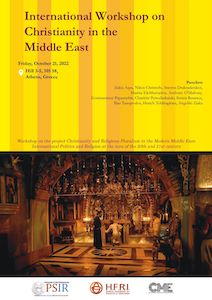 Christianity in the Middle East (CME) is organising an international workshop in Athens (Hill 3-5, 10558) on Friday, October 21, 2022, to promote an academic discussion on Christianity and Religious Pluralism in the modern Middle East.
Christianity in the Middle East (CME) is organising an international workshop in Athens (Hill 3-5, 10558) on Friday, October 21, 2022, to promote an academic discussion on Christianity and Religious Pluralism in the modern Middle East.
Experts on international politics and religion will address the various aspects of the current situation of Christians in the region.
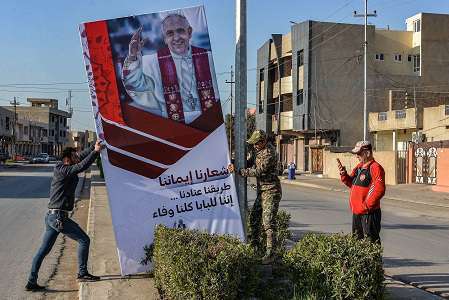 Pope Francis’ visit to Iraq from 5th to 8th March was significant and highly symbolic. It included the capital Baghdad, the cities of Najaf and Ur as well as various cities in Iraqi Kurdistan. Throughout this trip, the Pope tried to support the Christians of Iraq by making their suffering from the war and their current hardships widely known. He called for the protection of the Christian communities by the government and promoted a dialogue for peaceful coexistence among various religious communities.[1]
Pope Francis’ visit to Iraq from 5th to 8th March was significant and highly symbolic. It included the capital Baghdad, the cities of Najaf and Ur as well as various cities in Iraqi Kurdistan. Throughout this trip, the Pope tried to support the Christians of Iraq by making their suffering from the war and their current hardships widely known. He called for the protection of the Christian communities by the government and promoted a dialogue for peaceful coexistence among various religious communities.[1]
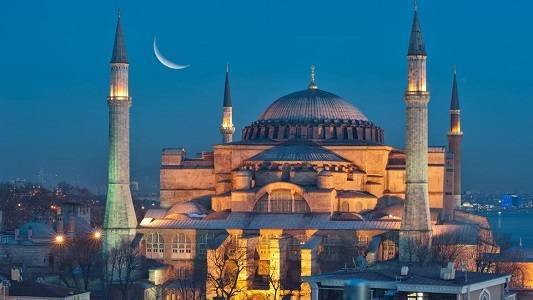 The decision of the Turkish Constitutional Court to revoke the almost 85-year-old museum status of Hagia Sophia and allow its conversion to a mosque did not come as a bolt out of the blue. Instead, it is the by-product of a decades – old battle concerning the republic’s oppressed Islamic soul and the orientations of her foreign policy vis-à-vis the Arab and the Muslim world.
The decision of the Turkish Constitutional Court to revoke the almost 85-year-old museum status of Hagia Sophia and allow its conversion to a mosque did not come as a bolt out of the blue. Instead, it is the by-product of a decades – old battle concerning the republic’s oppressed Islamic soul and the orientations of her foreign policy vis-à-vis the Arab and the Muslim world.

The video recording of the lecture by Anthony O' Mahony (Reader in Heythrop College of University of London) on: "Christians and the current crisis in the Middle East", which was co-organized by CEMMIS and the Institute for Alternative Policies (June 14, 2018).
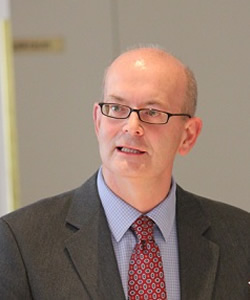
The Centre for Mediterranean, Middle East and Islamic Studies (CEMMIS) of the University of the Peloponnese and the Institute for Alternative Policies (ENA) organise a lecture by Anthony O' Mahony, Reader in Heythrop College of University of London on:
«Christians and the current crisis in the Middle East»
Both the lecture and the discussion will be conducted in English.
The event will take place on Thursday, June 14 (5:00 p.m.) in the premises of the Institute for Alternative Policies (Zalokosta 8, Athens).
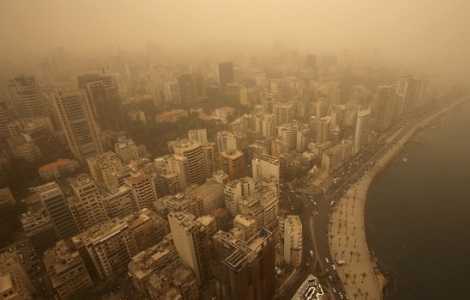
Lebanon’s size has always been inversely proportional to the magnitude of its turbulence. More of a mirror of the region’s intricacies than a catalyst, the country offers a unique regional case; although in ever-simmering tension, it manages to escape the contours of a country-wide flare-up. This is more often than not attributed to the country’s bitter memories of the civil war (1975-1990). For others, it is the product of an ill-thought out, yet relatively balanced consociational mechanism of power-sharing.
The Centre for Mediterranean, Middle East & Islamic Studies posts a multitude of positions in the context of free academic debate. These do not necessarily reflect the positions of the CEMMIS. The use and reproduction of the multimedia material displayed in the CEMMIS website has non-profit character and serves academic and educational purposes, with full respect to copyright and intellectual property laws, and in accordance with the Greek Laws 2121/1993 and 2557/1997.

